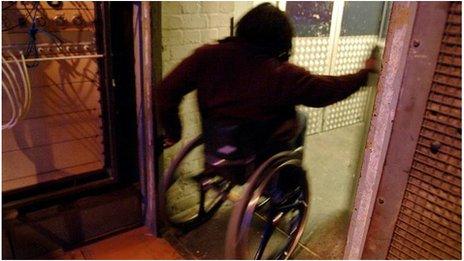Disability Living Allowance replaced by PIP scheme
- Published
- comments

Major changes to disability benefits for new claimants are being introduced in some parts of the UK ahead of a national roll-out of the new measures.
It is the start of the replacement of Disability Living Allowance (DLA) by Personal Independence Payments (PIP).
Work and Pensions Secretary Iain Duncan Smith said the current "ridiculous" system where people were given benefit with no further checks must end.
But charity Scope says the changes have been designed just to save money.
That charge has been denied by the government, which says spending will not be reduced, but more help will be given to those who need it most.
There are currently 3.3m people claiming DLA, compared to 1.1m when it was introduced in 1992.
PIPs will be introduced gradually for new claimants, starting in Merseyside, Cumbria, Cheshire and North East England.
Scope says 600,000 people will eventually lose their financial support.
Margaret Allen, who is registered blind: 'People need disability payment'
The disability benefits changes are the latest in a round of welfare reforms introduced at the start of April.
Figures from the Department for Work and Pensions (DWP) show that more than 70% of claimants get DLA for life.
But ministers believe the circumstances of some individuals can improve over time, so there is a case for more regular assessment.
Mr Duncan Smith told the Daily Mail: "Seventy per cent of people on it have lifetime awards which means no-one sees you ever again. It doesn't matter if you get better or your condition worsens - it's quite ridiculous."
"Taxpayers pay out £50bn in sickness and disability benefits - we're ahead of pretty much every other major country in the G20," he said.
"So this is not exactly what you would call harsh - this is quite reasonable to get it back under control and stop the unnecessary growth levels".
Minister for Disabled People Esther McVey said the PIP would give more targeted support than DLA.
"Disability Living Allowance is an outdated benefit... and needs reform to better reflect today's understanding of disability," she said.
"At the moment the vast majority of claimants get the benefit for life without any systematic reassessments and around 50% of decisions are made on the basis of the claim form alone".
"The Personal Independence Payment will include a new face-to-face assessment and regular reviews - something missing in the current system. This will ensure the billions we spend give more targeted support to those who need it most."
'Lifeline cut'
New claimants in the north of England will now begin face-to face assessments with Atos - one of two firms administering the process.
One of the new assessment criteria that has been heavily criticised is tougher rules to judge how far a person can walk.
Under the new regulations, claimants who are unable to walk more than 20m will qualify for the benefit, rather than the previous distance of 50m.
From June, new claims will be treated under the PIP system elsewhere - and in October some current DLA claimants will start moving to PIP if their circumstances change or an existing award ends.
But it will be two years before most existing claimants begin moving to PIP.
Even before the majority of the face-to-face re-assessments have taken place, the government claims the introduction of PIPs will reduce spending by a total of £2.2bn between now and May 2016 compared to spending projected under an unchanged system.
BBC reporter Emma Tracey said the 55-page DLA application form will not be missed, but that many disabled people have concerns that PIP assessors will not be able to fully grasp the extent of their needs.
One of those facing the changes is Margaret Allen, of Chadderton in Lancashire, who is registered blind with the hereditary eye disorder Retinitis pigmentosa and is unable to work.
She is worried the reforms will cause her to lose money for petrol, which she and her husband need to get around.
"My message to the government would be: 'Stop persecuting the entire sick and disabled population for a handful of people and listen.
"'People need it, they paid taxes.'"
Disability groups have argued that DLA is one of the most effectively targeted benefits, with an estimated fraud rate of just 0.5%.
Scope says DLA does need to be reformed but the new changes mean a "financial lifeline is being cut".
The charity's chief executive, Richard Hawkes, said: "Day-to-day life can be more expensive if people are disabled. These are tough times for everybody and times are even tougher if your everyday life experience is more expensive.
"The assessment itself has been designed to achieve a budget target of the reductions that the government talked about in the Comprehensive Spending Review. They said there was going to be a 20% reduction, then developed an assessment that will deliver that.
Milking the system, born and bred into welfare? Penalised because you can walk more than 20 metres?
"The assessment looks at an individual's condition, the health or medical condition of an individual, it doesn't look at what the fuller picture is and what the additional cost might be of being a disabled person."
Ms McVey denied that the government had any targets to reduce spending.
"We will be spending more in 2015-16 than we are spending now, and it will remain at approximately £13bn every year, so what the difference is and what the big reduction is in is actually in the growth of the number of people getting the benefit, which had gone up 35% in 10 years," she said.
She added that the changes are "about the fact that we couldn't have, by 2018, one in 17 people in the public on the benefit".
- Published26 October 2013
- Published8 April 2013
- Published8 April 2013
- Published8 April 2013
- Published29 April 2013
- Published8 April 2013
- Published26 March 2013
- Published4 April 2013